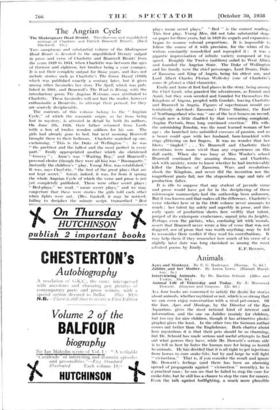The Angrian Cycle
The Shakespeare Head Bronte. Miscellaneous and unpublished writings of Charlotte and Patrick Branwell Bronte., (Basil Blackwell. 15s.) Tins sumptuous and substantial volume of the Shakespeare Head Bronte is devoted to the unpublished literary output in prose and verse of Charlotte and Branwell Bronte from the years 1829 to 1834, when Charlotte was between the ages of thirteen and eighteen, her brother being a year younger. It is not their complete output for those years, and does not include stories such as Charlotte's The Green Dwarf (1833) which was published exactly a century later, but it gives among other facsimiles her story The Spell, which was pub- lished in 1931, and Branwell's The Wool is Rising. with the introductory poem The Angrian Welcome, once attributed to Charlotte. These facsimiles will not lure the reader, however enthusiastic a Bronteite, to attempt their perusal, for they are scarcely decipherable.
The contents of this volume belong to the " Anglian Cycle," of which the romantic origin, so far from being lost in mystery, is attested in detail by both its authors. On June 5th, 1826, their father returned from Leeds with a box of twelve wooden soldiers for his son. The girls had already gone to bed, but next morning Branwell brought these to their bedroom. Charlotte snatched up one. exclaiming. " This is the Duke of Wellington " : he was " the prettiest and the tallest and the most perfect in every part." Emily appropriated another which she christened " Gravey " ; Anne's was " Waiting Boy," and Branwell's personal choice (though they were all his) was " Buonaparte." Instantly the children's " play, Young Men, was established." It was, says Charlotte, " the first of the great plays that are not kept secret." Great, indeed, it .vas, for from it sprang the whole Angrian Cycle of which the verse and prose is not yet completely published. There were other secret plays : " Bed-plays," we read, " mean secret- plays," and we may conjecture that these were stories the girls told each other when lights were opt.. (Mrs. Gaskell, it may be noticed. failing to decipher the minute script. transcribed " Best plays mean secret plays." " Bed " is the correct reading.) This first play, Young Men, did not take substantial shape on paper for three years, but in 1829 its sequels and expansions began to assume colossal proportions. It is impossible to follow the course of it with precision, for the whim of the writers constantly remodelled and repeopled it : it was a gigantic improvisation of infinite variety composed at top speed. Roughly the Twelve (soldiers) sailed to West Africa and founded the Angrian State. The Duke of Wellington and his family were the chief personages, Lord Douro, Duke of Zamorna and King of Angria, being his eldest son, and Lord Albert Charles Florian Wellesley (one of Charlotte's yams file plume) a chief chronicler.
Emily and Anne at first had places in the story, being among the Chief Genii, who guarded the adventurers, as Emmii and Annii, but they soon seceded and founded for themselves the Kingdom of Angora, peopled with Gondals, leaving Charlotte and Branwell in Angria. Figures of superhuman mould arc tentatively sketched : Zamorna's Prime Minister, the Earl of Northangerland who was " one of the best boxers on record, though now a little disabled by that tormenting,complaint, Angina Pectoris, from long continued exertion." His wife, the astonishing Zenobia, was the most learned woman of her age : she launched into unbridled excesses of passion, and as a boxer could spar with her husband, bare-knuckled with rings glittering on her fingers. It was no wonder that her blows " tingled." . . . To Branwell and Charlotte their inventions were more vivid than any experiences on this dull earth. When she was busy at Miss Wooler's school Branwell continued the amazing drama, and Charlotte, sick with anxiety, wrote to know whether he had irretrievably killed the Duchess of Zamorna. Wars and revolutions shook the Kingdom, and never did the invention nor the magnificent gusto fail, nor the stupendous rage and rate of production falter.
It is idle to suppose that any student of juvenile verse and prose would have got far in the deciphering of these microscopic manuscripts had the authorship been unknown. But it was known and that makes all the difference. Charlotte's. verse whether here or in the 1846 volume never amounts t(V. much ; her talent lay solely and superbly in prose, and this early spate of production -gums how swiftly that talent, purged of its extempore exuberanee,, Spared into its. heights. Perhaps even the pietists, who, confiiinieii'A iritklmorals, assert that Brariyvell never wrote a line of verse that wad not doggerel, nor of prose that was worth anything, may be lea- to reconsider 'their verdict if they read his contributions. It may help them if they remember how much of his verse of a slightly later date was long cherished as -among the most




















































 Previous page
Previous page